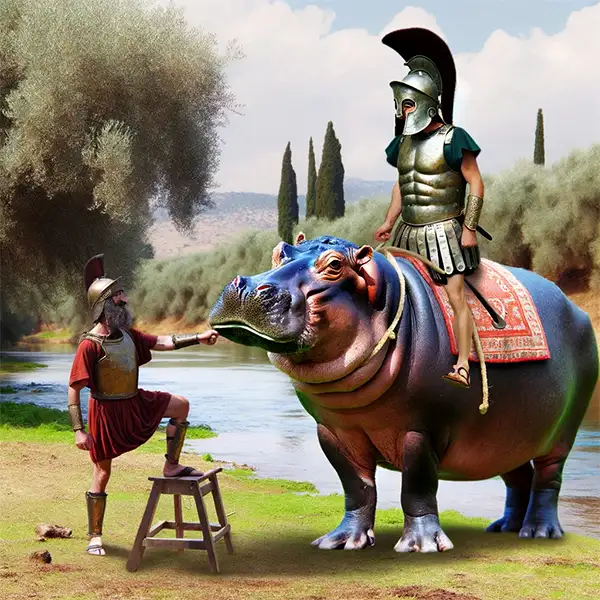A Tribute to Our Chubby Aquatic Friends
Once a year, there comes a day so grand and so profoundly important that it sends ripples of joy across the globe, stirring the hearts of animal enthusiasts, conservationists, and fans of large, semi-aquatic mammals everywhere. Yes, you guessed it—we're talking about World Hippo Day! This annual celebration, taking place on February 15th, is not just a day; it's an exuberant homage to one of nature's most intriguing and paradoxical creatures: the hippopotamus.
A Brief Dip into Hippo History
The saga of the hippopotamus, affectionately dubbed the "river horse" by the ancient Greeks, is a tale as old as time—or, at least, as old as any story involving a massive mammal that spends most of its life submerged in water can be. The name "hippopotamus" stems from the Greek words "hippos" (horse) and "potamos" (river), which could lead one to imagine ancient Greeks galloping on horseback through the Mediterranean, only to be baffled upon encountering these colossal, decidedly non-equine creatures lounging in African rivers.
 This historical mislabeling has caused no end of confusion, not just among the ancient Greeks, who presumably never tried to saddle a hippo, but also among modern-day enthusiasts who are left wondering how anyone could mistake these gargantuan, mostly aquatic beings for horses. It's akin to looking at a whale and calling it a "sea cow" —oh wait, we do that too.
This historical mislabeling has caused no end of confusion, not just among the ancient Greeks, who presumably never tried to saddle a hippo, but also among modern-day enthusiasts who are left wondering how anyone could mistake these gargantuan, mostly aquatic beings for horses. It's akin to looking at a whale and calling it a "sea cow" —oh wait, we do that too.
But the hippo's history is not just a series of mistaken identities. These creatures have roamed the Earth for millions of years, with their ancestors rubbing massive shoulders with dinosaurs. Imagine, if you will, a prehistoric landscape where the thunderous roar of a T-Rex was often accompanied by the serene splashing of a hippo ancestor, perhaps confusing the heck out of any time-traveling tourists.
In ancient Egypt, hippos were revered and feared in equal measure. They were associated with the god Seth, the deity of chaos and violence, which, given the hippo's reputation for unexpected aggressiveness, seems quite apt. Yet, they were also celebrated in art and culture, depicted in numerous frescoes and sculptures that hint at their significant role in the Egyptian worldview. This duality of reverence and fear encapsulates the hippo's place in human history—a creature admired for its strength and size yet respected for its power and potential for destruction.
Fast forward to the colonial era, where European explorers in Africa would write home about their encounters with these "river horses," often embellishing their tales with a mix of awe and a healthy dose of the improbable. These stories would captivate the imagination of the public back home, adding to the mystique and allure of the African continent and its exotic wildlife.
The fascination with hippos wasn't just limited to adventurers and ancient civilizations. In the early 20th century, the American public was briefly obsessed with the idea of importing hippos to Louisiana to solve a meat shortage, a scheme that was as bizarre as it was earnestly considered. Dubbed "American Hippo," the plan ultimately fell through, much to the relief of Louisiana residents who were not keen on the idea of sharing their bayous with hungry, hippo-sized neighbors.
In contemporary times, the hippo continues to capture our collective imagination, starring in countless documentaries, cartoons, and viral videos. They are the stars of zoo exhibits, the unwitting heroes of children's books, and the subjects of scientific research that continues to reveal surprising facts about their behavior, ecology, and genetics.
So, as we celebrate World Hippo Day and reflect on the rich tapestry of hippo history, let's raise a glass (or a water trough) to these magnificent "river horses." From ancient misnomers to modern conservation efforts, the story of the hippopotamus is a vivid reminder of the complexity, beauty, and sheer unpredictability of the natural world. And let's not forget, if you ever find yourself face-to-face with a hippo, it's probably best to remember they're more "potamos" than "hippos" and definitely not the type of horse you'd want to ride into the sunset.
Gentle Giants or Fierce Warriors?
Hippos are often portrayed as gentle giants, lazily wallowing in rivers with their little ears flicking and occasionally yawning wide enough to fit a small car in their mouths. However, beneath this serene exterior lies a surprising fact: hippos are one of the most dangerous animals in Africa. They're responsible for more human fatalities than many other animals, leading to the awkward moment at parties when mentioning you're a hippo enthusiast suddenly clears the room.
Celebrating Hippo-tastic Diversity
World Hippo Day isn't just about acknowledging the hippo's dual nature; it's also a celebration of their diversity. There are two main species: the large, common hippopotamus and the much rarer, significantly cuter pygmy hippopotamus. Pygmy hippos are like the common hippo's smaller, shyer cousin, who enjoys long walks in the forest and is less likely to charge at you in a fit of rage.

Conservation: A Hippo-sized Challenge
The day also shines a spotlight on the urgent need for hippo conservation. With habitat loss and poaching being significant threats, World Hippo Day is a call to action. It's a day when we don our hippo hats (figuratively and sometimes literally), spread awareness, and support efforts to ensure that future generations can also marvel at these magnificent creatures in their natural habitats, not just in viral YouTube videos.
How to Celebrate World Hippo Day
Celebrating World Hippo Day can involve a range of activities, from the educational to the downright silly. You could donate to a wildlife fund, adopt a hippo (not literally, unless you have a very large pool and an understanding neighborhood), or simply spend the day learning fun hippo facts to impress your friends. For instance, did you know hippos secrete a natural sunscreen called "blood sweat"? It's neither blood nor sweat, but it does provide essential UV protection and gives them a fetching pink hue.
So, on World Hippo Day, let's prepare to pay tribute to these fascinating creatures that defy categorization. Whether it's by advocating for their conservation, educating others about their unique qualities, or simply appreciating the sheer wonder they bring to our world, let's give hippos the adoration they deserve. After all, in a world that can often seem divided, perhaps what we need is a day dedicated to celebrating something we can all agree on: hippos are, quite simply, awesome.
Remember, World Hippo Day is not just a day; it's a state of mind. So, let's channel our inner hippos—stay cool, submerge ourselves in the things we love, and, every once in a while, open our mouths wide to make a big splash!
Please Share our Content






 This historical mislabeling has caused no end of confusion, not just among the ancient Greeks, who presumably never tried to saddle a hippo, but also among modern-day enthusiasts who are left wondering how anyone could mistake these gargantuan, mostly aquatic beings for horses. It's akin to looking at a whale and calling it a "sea cow" —oh wait, we do that too.
This historical mislabeling has caused no end of confusion, not just among the ancient Greeks, who presumably never tried to saddle a hippo, but also among modern-day enthusiasts who are left wondering how anyone could mistake these gargantuan, mostly aquatic beings for horses. It's akin to looking at a whale and calling it a "sea cow" —oh wait, we do that too.









 "Sláinte!" is a traditional Irish expression used as a toast, equivalent to "Cheers!" in English.
"Sláinte!" is a traditional Irish expression used as a toast, equivalent to "Cheers!" in English.